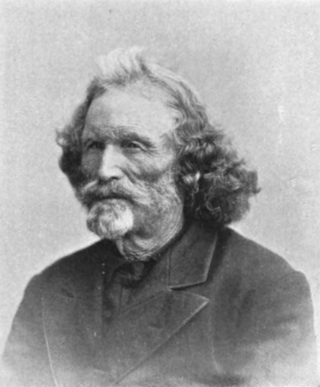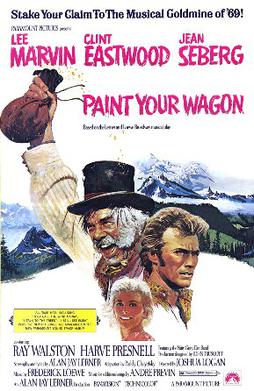
The Donner Party, sometimes called the Donner–Reed Party, were a group of American pioneers who migrated to California in a wagon train from the Midwest. Delayed by a multitude of mishaps, they spent the winter of 1846–1847 snowbound in the Sierra Nevada. Some of the migrants resorted to cannibalism to survive, mainly eating the bodies of those who had succumbed to starvation, sickness, or extreme cold, but in one case two Native American guides were murdered and eaten.

Crazy Horse was a Lakota war leader of the Oglala band in the 19th century. He took up arms against the United States federal government to fight against encroachment by White American settlers on Native American territory and to preserve the traditional way of life of the Lakota people. His participation in several famous battles of the Black Hills War on the northern Great Plains, among them the Fetterman Fight in 1866, in which he acted as a decoy, and the Battle of the Little Bighorn in 1876, in which he led a war party to victory, earned him great respect from both his enemies and his own people.

The Battle of Killdeer Mountain took place during Brig. Gen. Alfred Sully's expedition against the Sioux in Dakota Territory July 28–29, 1864. The location of the battleground is in modern Dunn County, North Dakota. With a total of more than 4,000 soldiers involved in the total operation, and more than 2,000 in the battle, Sully's expedition was the largest ever carried out by the U.S. army against Native Americans.

The Powder River Expedition of 1865 also known as the Powder River War or Powder River Invasion, was a large and far-flung military operation of the United States Army against the Lakota Sioux, Cheyenne, and Arapaho Indians in Montana Territory and Dakota Territory. Although soldiers destroyed one Arapaho village and established Fort Connor to protect gold miners on the Bozeman Trail, the expedition is considered a failure because it failed to defeat or intimidate the Indians.
Frontierland is one of the "themed lands" at the many Disneyland-style parks run by Disney around the world. Themed to the American frontier of the 19th century, Frontierlands are home to cowboys and pioneers, saloons, red rock buttes and gold rushes along with some influence from American history, North America in general and Latin America. It is named Westernland at Tokyo Disneyland and Grizzly Gulch at Hong Kong Disneyland.

Jim Baker (1818–1898), known as "Honest Jim Baker", was a frontiersman, trapper, hunter, army scout, interpreter, and rancher. He was first a trapper and hunter. The decline of the fur trade in the early 1840s drove many trappers to quit, but Baker remained in the business until 1855. During that time he was a friend of Jim Bridger, Kit Carson and John C. Frémont. On August 21, 1841, he was among a group of twenty three trappers who were attacked by Arapaho, Cheyenne, and Sioux on what became known as Battle Mountain. After Henry Fraeb was killed, Baker organized the trappers against the Native Americans in a multiple-day fight.

Into the West is the 2005 western miniseries produced by Steven Spielberg and DreamWorks, with six two-hour episodes. The series was first broadcast in the U.S. on TNT beginning June 10, 2005. It was also shown in the UK on BBC2 and BBC HD from November 4, 2006, and in Canada on CBC Television. The series also aired in the U.S. on AMC during June/July and September/October of 2012.
Matȟó Wayúhi was a Brulé Lakota chief who signed the Fort Laramie Treaty (1851). He was killed in 1854 when troops from Fort Laramie entered his encampment to arrest a Sioux who had shot a cow belonging to a Mormon emigrant. All 30 troopers in the army detachment were annihilated, in what would be called the Grattan massacre or "the Mormon Cow War" according to Army Historian S.L.A. Marshall in his book Crimsoned Prairie. Little Thunder took over as chief after his death.
The following timeline provides an almost day-to-day basic description of events directly associated with the 1846 Donner Party pioneers, covering the journey from Illinois to California—2,500 miles, over the Great Plains, two mountain ranges, and the deserts of the Great Basin.

Kicking Bear was an Oglala Lakota who became a band chief of the Miniconjou Lakota Sioux. He fought in several battles with his brother, Flying Hawk, and first cousin, Crazy Horse, during the War for the Black Hills, including the Battle of the Greasy Grass.
The Giant of Thunder Mountain is a 1991 drama film starring Richard Kiel and Noley Thornton. Bart the Bear also appeared in the movie. The screenplay was jointly written by Richard Kiel, Chrystle Fiedler, and Tony Lozito. It was directed by James W. Roberson.

Frances Stewart Silver was hanged in Morganton, Burke County, North Carolina for the axe murder of her husband Charles Silver. Frankie Silver, as she was known, is believed to have been the first woman executed in North Carolina.

Paint Your Wagon is a 1969 American Western musical film starring Lee Marvin, Clint Eastwood, and Jean Seberg. The film was adapted by Paddy Chayefsky from the 1951 musical Paint Your Wagon by Lerner and Loewe. It is set in a mining camp in Gold Rush-era California. It was directed by Joshua Logan.
The Black Hills Expedition was a United States Army expedition in 1874 led by Lieutenant Colonel George Armstrong Custer that set out on July 2, 1874, from Fort Abraham Lincoln, Dakota Territory, which is south of modern day Mandan, North Dakota, with orders to travel to the previously uncharted Black Hills of South Dakota. Its mission was to look for suitable locations for a fort, find a route to the southwest, and to investigate the possibility of gold mining. Custer and his unit, the 7th Cavalry, arrived in the Black Hills on July 22, 1874, with orders to return by August 30. The expedition set up a camp at the site of the future town of Custer; while Custer and the military units searched for a suitable location for a fort, civilians searched for gold, and it is disputed whether or not any substantial amount was found. Nonetheless, this prompted a mass gold rush which in turn antagonised the Sioux Indians who had been promised protection of their sacred land through Treaties made by the US government, and who were later to kill Custer at the Battle of the Little Big Horn in the Great Sioux War of 1876–1877 between themselves and the United States.

Timber Falls is a 2007 American horror film directed by Tony Giglio and starring Josh Randall and Brianna Brown. In Brazil it was released with the title Wrong Turn 2. In Mexico it was released with the title Wrong Turn 3.

Jules Marquard Eichorn was an American mountaineer, environmentalist, and music teacher.
The Detroit Film Critics Society is a film critic organization based in Detroit, Michigan, United States. It was founded in 2007, and comprises a group of over twenty film critics. To become a member, the critic must have reviewed at least twelve films a year in an established publication, with no more than two different critics per publication admitted. It presents annual awards at the end of the year, for the best films of the preceding year.

Dark Mountain is a 1944 American film noir crime film directed by William Berke. It is also known as Thunderbolt and Thunder Mountain.

The Power's Cabin shootout, or the Power Brothers shootout, occurred on February 10, 1918, when a posse attempted to arrest a group of miners at their cabin in the Galiuro Mountains. Four men were killed during the shootout, including three lawmen and Jeff Power, the owner of the cabin. The Power brothers, Tom and John, then escaped to Mexico with a man named Tom Sisson, but they were eventually caught after what was then the largest manhunt in the history of Arizona.
James Nugent, known as "Rocky Mountain Jim" was prominent in the early history of Estes Park, in the Rocky Mountain National Park, Colorado, USA. A guide for visitors, his character was described in the writings of an English explorer, Isabella Bird.












